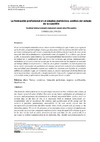Please use this identifier to cite or link to this item:
https://accedacris.ulpgc.es/jspui/handle/10553/75873
| Title: | La formación profesional en el empleo doméstico: análisis del estado de la cuestión | Authors: | Grau Pineda, María Del Carmen | UNESCO Clasification: | 560507 Derecho público 560504 Derecho constitucional 560508 Derecho privado |
Keywords: | Trabajo doméstico Formación profesional Mujeres Cualificación Dignificación, et al |
Issue Date: | 2020 | Journal: | Lan harremanak: Revista de relaciones laborales | Abstract: | El sector del empleo doméstico es un observatorio privilegiado que evidencia la vigencia de la división sexual del trabajo clásica que descansa sobre la explotación laboral de las personas trabajadoras del sector y perpetúa la discriminación por razón de sexo en un mercado laboral profundamente segmentado como el español. Y es evidente que, frente a ello, es necesario tanto fomentar la corresponsabilidad intrafamiliar como incentivar la formación y cualificación del colectivo y los servicios que presta, fundamentales,
ineludibles en el nuevo contexto social que la incorporación de las mujeres al mercado de trabajo dibuja en el presente y, como no, en el futuro inmediato. Se está en presencia de un sector emergente, un yacimiento de empleo, un servicio esencial a la comunidad y una actividad cuya demanda seguirá una tendencia creciente ante la falta de provisión pública de cuidados y que, por el bien de todos, es preciso replantear de forma inminente en la siguiente línea: dignificarla y profesionalizarla. Y para ello el papel de la formación
y la cualificación profesional es innegable se mire por donde se mire. The domestic employment sector is a privileged observatory that evidences the validity of the classic sexual division of labor that rests on the labor exploitation of substitutes or servants and perpetuates discrimination in a deeply segmented labor market. And it is evident that, in the face of this, it is necessary both to promote intra-family co-responsibility and to encourage the training and qualification of the group and the services it provides, fundamental, unavoidable in the new social context that the incorporation of women into the labor market draws in the present and, of course, in the immediate future. We are in the presence of an emerging sector, a source of employment, an essential service to the community and an activity whose demand will continue to grow in the face of the lack of public provision of care and that, for the good of all, it is necessary to rethink imminent form in the following line: dignify and professionalize it. And for this, the role of training and professional qualification is undeniable no matter where you look. |
URI: | https://accedacris.ulpgc.es/handle/10553/75873 | ISSN: | 1575-7048 | DOI: | 10.1387/lan‐harremanak.22195 | Source: | Lan Harremanak: Revista de Relaciones Laborales [ISSN 1575-7048], n. 44 |
| Appears in Collections: | Artículos |
Page view(s)
130
checked on Dec 14, 2024
Download(s)
241
checked on Dec 14, 2024
Google ScholarTM
Check
Altmetric
Share
Export metadata
Items in accedaCRIS are protected by copyright, with all rights reserved, unless otherwise indicated.
